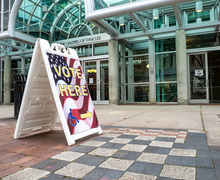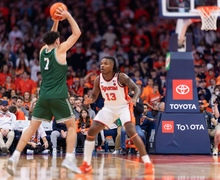Liberal : Laws should protect citizens filming police arrests
In recent months, citizens videotaping police activity have escalated conflict with the police. Most of the confrontations are a result of the increasingly easy access to cameras and video recorders on cellphones.
In most of these situations, police proceed about their jobs, but there are a growing number of reports that police have intimidated people who take videos. Because police can easily abuse their power and intimidate, laws should limit the police’s ability to confiscate or delete footage.
In one incident, reported in the Baltimore Sun, a man who took video of his friend being arrested at a horse racing event in 2010. Police asked the man to surrender his camera as evidence. The man eventually complied and later found that the video had been deleted. Now, the American Civil Liberties Union is suing The Baltimore police department.
In Philadelphia, two people recorded a woman whose head was repeatedly slammed into a police cruiser. Shakir Riley, one of the people filming told the Philadelphia Inquirer that police ‘beat him, poured a soda on his face and stomped on his phone, destroying the video he had just taken.’ Police claimed that filming was a violation of federal law. Riley and the other person filming were charged with disorderly conduct, only to have the charges dropped.
These incidents, two of a growing number, highlight the need for greater protections from police. Deborah Jeon, ACLU legal director, told The Baltimore Sun, ‘It is antithetical to a democracy for the government to tell its citizens that they do not have the right to record what government officials say or do or how they behave in public.’
Police officers offer a different perspective. Allowing people to record can often distract police from their duties. Officers may be too preoccupied by the potential biases of the video. By not capturing the whole incident and the background, those who view the video may not have the full information needed to judge the situation. While video may offer a biased perspective, this should not be cause for police to overstep their authority and confiscate videos.
A commonality in several of the incidents is that officers use the law and their position of authority to compel people taking video to surrender their footage. The unevenness in power requires that the law protects citizens who are simply exercising their rights to film in public spaces. Police should be barred from making illegitimate threats and lying to the public.
Some states’ courts, such as in Illinois and Massachusetts, have interpreted existing laws to determine videotaping police or anyone without their consent represents a violation of the privacy of the person being filmed. Certain exceptions exist. Other states have no precedent or definitive ruling which states that videotaping is illegal.
Interpretations from these courts conflict with the basic rights citizens have to hold the government and its employees accountable. Without video evidence of police abuses, oftentimes a police officer’s word is valued over a citizen’s word.
The goal of a proposed law to permit citizens to videotape would not try to make police work more difficult. Instead, protecting the public’s right to videotape would promote accountability. Those who are supposed to protect us should not be exempt from justice.
Harmen Rockler is a junior newspaper and political science major. His column appears every Monday. He can be reached at horockle@syr.edu.
Published on October 1, 2011 at 12:00 pm





